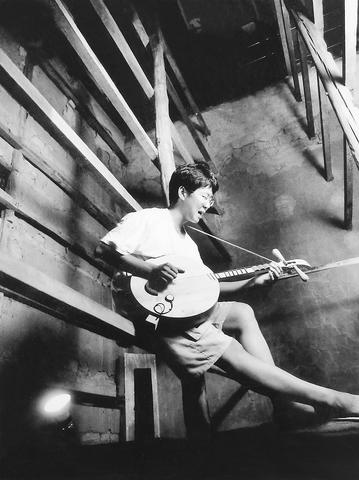World music has come to Taiwan in a big way, with Taiwan Arts International Association's (TAIA,
While both the TAIA and Tree Music events featured some Asian artists, it was acts from Europe that tended to dominate. During a press conference for the second TAIA World Music Festival last year, Serina Chen (
The Asian Music Festival is the first major music event hosted by Fnac, whose Literature Cafe and related activities have already gained a strong following. Since it was established in Taipei, Fnac has always had an extensive World Music section, an extension of its commitment to world music in its French stores. For the event, Fnac has produced a catalogue of over 80 world music CDs from its total collection. In order to meet the needs of the current event, it has also increased its selection, especially with music from Okinawa, which will feature in the opening concert tomorrow.

PHOTO: FNAC
According to Ho Ying-yi (
A good example of this is one group from Japan -- Okuma Wa Taru and Sakamoto Hiromichi, who play a hybrid of Japanese temple music and American blues which has proved very popular at world music events around the world. The An-Chang Project plays the folk music of Okinawa, drawing on influences as diverse as Japan, the US and the South Pacific. The use of Japanese instruments such as the samshin and raw chanting vocals give the music an eerie power, while occasionally breaking into the easier rhythm of Pacific island culture.
Three groups from Taiwan, representing very different musical traditions will also perform. The best known of these is Labor Exchange (
With only five groups spread over four concerts, the Fnac Asian Music Festival is a rather small affair, especially as everyone will be crammed into the small Fnac coffee shop. To beef up the lineup, screenings of five other concerts will be held through the month.
A photo exhibition and workshops for those who want to get a deeper understanding of various styles of folk music are also part of the festival. Best of all, CDs in Fnac's World Music collection will be sold at a 20 percent discount to Fnac cardholders for the month of June.

In the March 9 edition of the Taipei Times a piece by Ninon Godefroy ran with the headine “The quiet, gentle rhythm of Taiwan.” It started with the line “Taiwan is a small, humble place. There is no Eiffel Tower, no pyramids — no singular attraction that draws the world’s attention.” I laughed out loud at that. This was out of no disrespect for the author or the piece, which made some interesting analogies and good points about how both Din Tai Fung’s and Taiwan Semiconductor Manufacturing Co’s (TSMC, 台積電) meticulous attention to detail and quality are not quite up to

April 21 to April 27 Hsieh Er’s (謝娥) political fortunes were rising fast after she got out of jail and joined the Chinese Nationalist Party (KMT) in December 1945. Not only did she hold key positions in various committees, she was elected the only woman on the Taipei City Council and headed to Nanjing in 1946 as the sole Taiwanese female representative to the National Constituent Assembly. With the support of first lady Soong May-ling (宋美齡), she started the Taipei Women’s Association and Taiwan Provincial Women’s Association, where she

Chinese Nationalist Party (KMT) Chairman Eric Chu (朱立倫) hatched a bold plan to charge forward and seize the initiative when he held a protest in front of the Taipei City Prosecutors’ Office. Though risky, because illegal, its success would help tackle at least six problems facing both himself and the KMT. What he did not see coming was Taipei Mayor Chiang Wan-an (將萬安) tripping him up out of the gate. In spite of Chu being the most consequential and successful KMT chairman since the early 2010s — arguably saving the party from financial ruin and restoring its electoral viability —

It is one of the more remarkable facts of Taiwan history that it was never occupied or claimed by any of the numerous kingdoms of southern China — Han or otherwise — that lay just across the water from it. None of their brilliant ministers ever discovered that Taiwan was a “core interest” of the state whose annexation was “inevitable.” As Paul Kua notes in an excellent monograph laying out how the Portuguese gave Taiwan the name “Formosa,” the first Europeans to express an interest in occupying Taiwan were the Spanish. Tonio Andrade in his seminal work, How Taiwan Became Chinese,